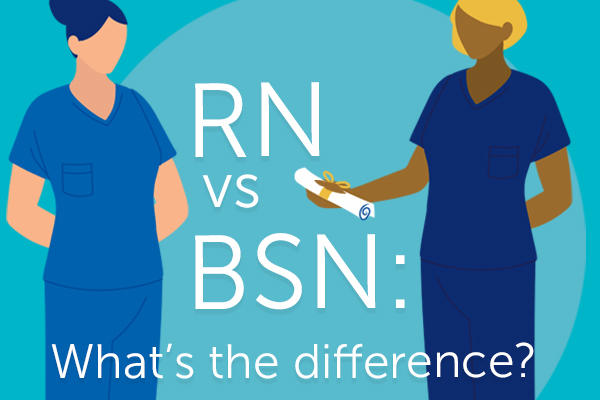Featured
Tags
Share
- Home / Blog / Tips for Students / RN vs BSN: What’s the Difference?
RN vs BSN: What’s the Difference?

Nursing offers a wealth of job options and specialties — from tending to patients at the bedside, to conducting research, to providing education, to leading at the executive level and more.
Depending on the career path you choose, you may need different certifications and levels of nursing education. Aspiring nurses exploring their educational options often ask, “Is a BSN program an RN program?”
Here, we break down how RN vs. BSN credentials differ, touch on ADN vs. BSN differences, and explore whether our RN to BSN program may be the best choice for you.
BSN, ADN, RN: The Difference in Nursing Credentials
RN Licensure:
- To become a registered nurse, one needs to pass the National Council Licensure Examination for Registered Nurses (NCLEX-RN) after completing an approved nursing program: a BSN, an ADN, or a diploma program.
- RNs can work in various healthcare settings, including hospitals, clinics, nursing homes and private practices.
BSN Degree:
- The Bachelor of Science in Nursing (BSN) is a four-year undergraduate nursing degree that provides a comprehensive education in nursing and healthcare.
- BSN programs typically include courses in anatomy, physiology, pharmacology, nursing theory and clinical practice.
- Graduates with a BSN degree can work in various healthcare settings, hold leadership positions, and pursue advanced nursing degrees such as master’s or doctoral degrees.
ADN Degree:
- An ADN degree is an associate degree in nursing. It involves a two-year nursing program that prepares individuals to become registered nurses.
- ADN programs typically include courses in nursing fundamentals, pharmacology and clinical practice.
- Graduates with an ADN degree can take the NCLEX-RN and work as an RN in various healthcare settings.
Differences Between RN and BSN
When comparing the RN vs. BSN differences, first know that we are talking about a licensure vs. a level of education. Let’s dive deeper:
What is an RN?
An RN is a registered nurse who has completed all educational and examination requirements. RNs are licensed to practice nursing in their state. Registered nurse is also a job title or position.
The first step to becoming an RN is to earn a diploma or an associate or bachelor’s degree in nursing. Once you’ve completed your nursing program, you will sit for the NCLEX-RN Exam, administered by the National Council of State Boards of Nursing (NCSBN). Once testing and education requirements are satisfied, you can apply for licensure in the state where you intend to practice.
What is a BSN?
A BSN is an educational degree rather than a licensure or job title.
Nurses can earn a BSN degree in one of two ways. You can pursue a BSN and RN at the same time through an entry-level nursing program like Chamberlain’s 3-Year BSN degree. Alternately, you could become an RN through a diploma or an ADN nursing program, and later return to school to complete your BSN degree through an RN to BSN online program.
What Is the RN vs. BSN Difference?
In a nutshell, a BSN is the degree you earn. RN is the licensure you are granted through your state.
Which Is Better: RN or BSN?
In weighing the RN vs. BSN choice, your first decision will be what level of education you’d like to pursue.
Earning a diploma or associate degree takes less time to complete, may cost less than a BSN degree, and can get you into the workforce faster. Of course, this route has some downsides, too. One thing to consider is RN vs. BSN job availability. According to the Bureau of Labor Statistics’ Occupational Outlook Handbook: “Generally, licensed graduates of any of the three types of education programs (bachelor’s, associate’s, or diploma) qualify for entry-level positions as a staff nurse. However, employers — particularly those in hospitals — may require a bachelor’s degree.”1
Increasingly, a BSN degree is becoming the nursing degree of choice for other reasons as well.
Pros and Cons of Becoming an RN With a BSN
| Pros | Cons |
| Expanded curriculum | Additional schooling required |
| Growing demand for BSN-prepared nurses | Greater responsibility |
| Reaching your educational goals | Financing of additional education |
Why is the BSN becoming the Expected Degree?
A number of forces are driving the RN vs. BSN conversation. These include:
- Research indicating BSNs may influence better health outcomes for patients
- Recommendations from the Institute of Medicine (IOM)
- Emerging state legislation
Learning more about these topics may also help you decide your RN vs. BSN path:
1. The Future of Nursing Report: A Blueprint for Action
The IOM, in collaboration with the Robert Wood Johnson Foundation Initiative on the Future of Nursing, published an influential 600-plus page report titled “The Future of Nursing: Leading Change, Advancing Health.”
One of the recommendations made in the report has been a driving force behind making the BSN degree the desired entry point for new nurses: “Academic nurse leaders across all schools of nursing should work together to increase the proportion of nurses with a baccalaureate degree from 50 to 80 percent by 2020.” According to the Journal of Nursing Regulation, 65.2% of RNs held bachelor’s degrees in 2020.
2. American Nurses Credentialing Center (ANCC) Magnet Status
The ANCC set up a Magnet Recognition Program as a way to help meet the IOM goal. To receive this recognition, healthcare organizations must undergo a rigorous examination. This examination includes a site visit to ascertain that nurses working in the facility feel that they contribute to decision-making, have opportunities for advancement, and are satisfied with their work.
As part of this process, the American Association of Colleges of Nursing has said that an organization must document that 80% of its nursing workforce has earned a BSN, or show it has a plan to achieve this goal. All nurse managers in Magnet organizations must have a BSN degree or higher. (The Impact of Education on Nursing Practice).
Research comparing Magnet to non-Magnet hospitals concluded that hospitals with Magnet status scored better on nurse participation in hospital affairs, nurse manager ability, leadership and support, and nurse-physician relations. The nurses also reported a lower level of burnout.
3. Emerging State Legislation
The “BSN in 10” law — which requires all nurses to earn a BSN within 10 years of initial licensure — took effect in New York state in December 2017. The bill stated:
The nurse of the future must be prepared to partner with multiple disciplines as a collaborator and manager of the complex patient care journey...This legislation affects future nurses graduating from associate degree or diploma nursing programs who would be required to obtain a baccalaureate in nursing within ten years of initial licensure.
4. Research Links a BSN Degrees to Better Patient Outcomes
Research increasingly shows that organizations with a large number of BSN-educated nurses have better outcomes. One influential study published in 2013 examined four factors — education, staffing, skill mix, and years of experience as an RN — and their relationship to patient mortality rates and “failure to rescue” (i.e., death following the development of a complication). Education was the only significant factor in decreasing these rates.
Another study driving the RN vs. BSN discussion was conducted in 2018. Researchers searched six databases, among other sources, to examine more than 2,000 studies that explored the relationship between higher levels of nurse education and patient outcomes. They selected 27 of them that met their inclusion criteria. Among their findings:
- “Overall, higher levels of education were associated with lower risks of failure to rescue and mortality in 75% and 61.1% of the reviewed studies…”
- “Only one study examined the 80% threshold proposed by the Institute of Medicine and found evidence that it is associated with lower odds of hospital readmission and shorter lengths of stay"
RN vs BSN: Final Analysis
The key takeaway when thinking about RN vs. BSN differences is that RN is a licensure to practice nursing, granted by your state. A BSN is your level of education — and one that is increasingly being seen as the future of nursing.
At Chamberlain University, we’ve been educating and empowering nurses for more than 130 years and are now preparing the next generation of healthcare professionals for a vibrant future. Through hands-on experience, cutting-edge curriculum, and mentorship, you can earn a degree from the largest Bachelor of Science in Nursing (BSN) program in the United States.
Choose our online, campus hybrid, or evening-weekend option and chart your course to a 3-year BSN degree.
Earning a BSN: Q&A
I’m just starting out, and I know I want to get my BSN. What’s the best path for me?
We would encourage you to check out an entry-level program like Chamberlain University’s 3-Year online BSN program With this BSN Degree Online Option, you don’t need to be a registered nurse to apply, and there are no prerequisites.
I already have a bachelor’s degree in another area, but I’m not an RN. What program is right for me?
Chamberlain welcomes qualifying transfer credits! Before you enroll in the 3-Year BSN program, your admissions team will do a transcript evaluation to see what credits might transfer into the program. View more of the transfer credit guidelines.
I have an associate degree/diploma in nursing. How long are RN to BSN programs?
The RN to BSN Online Option can be completed in as few as three semesters of year-round study (a little over a year of full-time online classes).
Read more: How Long is RN to BSN?
Can I still work while earning a BSN degree?
Absolutely. If you’re already an RN, our RN to BSN program option is designed for busy, working nurses. You will have no mandatory login times, allowing you more flexibility to complete your weekly assignments according to your schedule.
If you’re not yet a nurse, select campuses at Chamberlain offer an evening and weekend nursing program. Our BSN degree online option also offers a hybrid model, with online coursework and hands-on clinical rotations at various locations in the United States.1
Is someone available to talk through my options with me?
Of course! You’re never alone in navigating your educational options. We're here to support and guide you toward the path that makes the most sense for you. Call us at 877.751.5783.
Chamberlain University, an accredited institution, offers bachelor’s, master’s, doctoral and certificate programs in nursing and healthcare professions. With a growing network of campuses and robust online programs, Chamberlain continues to build on more than 130 years of excellence in preparing extraordinary healthcare professionals.
1Clinical site location is not guaranteed and may require travel.
1Source: https://www.bls.gov/ooh/healthcare/registered-nurses.htm#tab-4
By Chamberlain University
Learn more about our RN to BSN Program
The RN to BSN program is designed to fit around your schedule and life -- with no mandatory log-in times and 100% online coursework.
More from Tips for Students
Request More Information
To receive the Chamberlain University Program Guide, including associated career paths, please select a program of study.






